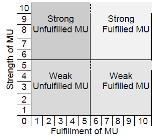Self-perceived quality-of-life scale
Self-perceived quality-of-life scale
The self-perceived quality-of-life scale is a psychometric tool used to measure an individual's subjective assessment of their own quality of life. This scale is often utilized in psychology, sociology, and healthcare to evaluate the well-being and life satisfaction of individuals.
Overview[edit | edit source]
The self-perceived quality-of-life scale typically includes a series of questions or statements that respondents rate based on their personal experiences and feelings. These questions may cover various domains such as physical health, mental health, emotional well-being, social relationships, and environmental factors.
Domains[edit | edit source]
The scale often assesses multiple domains, including but not limited to:
- Physical Health: Questions related to the individual's physical condition, energy levels, and ability to perform daily activities.
- Mental Health: Questions that evaluate the individual's emotional state, presence of anxiety or depression, and overall mental well-being.
- Emotional Well-being: Questions that focus on the individual's feelings of happiness, contentment, and emotional stability.
- Social Relationships: Questions that assess the quality and satisfaction of the individual's relationships with family, friends, and colleagues.
- Environmental Factors: Questions that consider the individual's living conditions, safety, and access to resources.
Applications[edit | edit source]
The self-perceived quality-of-life scale is used in various fields:
- In healthcare, it helps in assessing the impact of chronic illnesses, disabilities, and treatments on patients' lives.
- In psychology, it aids in understanding the effects of mental disorders and therapeutic interventions.
- In sociology, it provides insights into the well-being of different demographic groups and the impact of social policies.
Advantages[edit | edit source]
- Subjective Measurement: It captures the individual's personal perspective, which is crucial for understanding their true quality of life.
- Comprehensive Assessment: It covers multiple domains, providing a holistic view of the individual's well-being.
- Versatility: It can be adapted for different populations and settings.
Limitations[edit | edit source]
- Subjectivity: The results are based on personal perceptions, which can be influenced by temporary emotions or biases.
- Cultural Differences: The interpretation of questions may vary across different cultures, affecting the reliability of the scale.
See Also[edit | edit source]
References[edit | edit source]
External Links[edit | edit source]
Navigation: Wellness - Encyclopedia - Health topics - Disease Index - Drugs - World Directory - Gray's Anatomy - Keto diet - Recipes
Search WikiMD
Ad.Tired of being Overweight? Try W8MD's physician weight loss program.
Semaglutide (Ozempic / Wegovy and Tirzepatide (Mounjaro / Zepbound) available.
Advertise on WikiMD
WikiMD is not a substitute for professional medical advice. See full disclaimer.
Credits:Most images are courtesy of Wikimedia commons, and templates Wikipedia, licensed under CC BY SA or similar.Contributors: Prab R. Tumpati, MD



